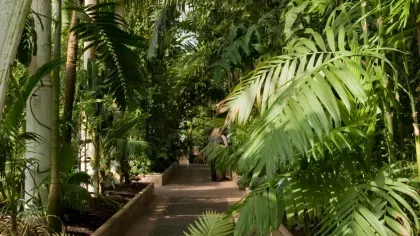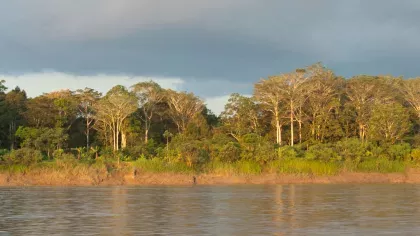Medicinal plant knowledge shared amongst Amazonian ethnic groups
Peter Giovannini describes his study on the traditional knowledge of the Achuar (Jivaro) and how this relates to the knowledge of other Amazonian ethnic groups.

Traditional Ecological Knowledge
Traditional Ecological Knowledge (TEK) is the body of knowledge, practices and beliefs that a group of people develops about their environment. Ethnobotanical knowledge of indigenous people, the part of traditional knowledge that concerns plants, is likely to be vastly under-documented, and there is growing evidence that this knowledge is eroding and/or changing in many parts of the world.
The diversity of languages spoken in a defined region is used as an indicator for the status and trends of traditional knowledge by the CBD and UNESCO. Between 1970 and 2005, indigenous linguistic diversity in the Americas (North and South) declined by 64%, and researchers also found that of a total of 521 languages in South America, 204 are classified as “dead or dying” and 133 as “in trouble”.
Along with documenting Traditional Ecological Knowledge, ethnobotanists are also interested in understanding how TEK changes and is transmitted under different conditions. A better understanding of TEK can be used to tackle knowledge loss, and help traditional communities adapt to environmental changes.
Exotic plants used in traditional medicine
A shared and surprising finding of my research on the medicinal plants used by an indigenous group in Mexico (the Mazatecs) and an indigenous group of Amazonian Ecuador (the Achuar) is that one of the most used medicinal plants is ginger (Zingiber officinale) a species native to Asia. Could this suggest that Traditional Ecological Knowledge is not as traditional as people tend to believe?
The Achuar (Jivaro)
Amazonia is home to many indigenous ethnic groups with different levels of integration to the market and different history of contact with outsiders.
The Achuar are indigenous peoples living in Amazonian Ecuador and Peru belonging to the Jivaroan linguistic family, which includes also the Humabisa, the Aguaruna and the Shuar. The Achuar of Ecuador were contacted by missionaries in the 1960s and relatively little was known about their use of medicinal plants. Ethnographic work conducted among the Achuar between 1976 and 1978 suggests that the Achuar medical system was based mainly on Shamanism rather than on the use of herbal medicine. In contrast to the Achuar, the botanical knowledge of the Shuar, a linguistically related ethnic group living in the same region, has been widely studied.
Integrating traditional and modern medicine
In 2011, I conducted a study on the medicinal plants of the Achuar with the purpose of creating a medicinal plants manual for the local indigenous health workers. Such a manual could be used to support the integrated use of traditional and modern medicine in Achuar communities, and minimise the abuse of pharmaceuticals observed by the physician and the nurses working in the area.
The data collected during the first survey among the Achuar provided an interesting case study to contribute to our understanding of the dynamics of Traditional Ecological Knowledge.
More specifically, the data was used to answer the following questions:
- How much does the current use of herbal medicine by the Achuar differ from that of the Shuar and of other Amazonian indigenous groups?
- Considering the Achuar have probably undergone an epidemiological change (i.e. a change in the medical problems affecting the population) due to a recent change in lifestyle, to what extent does their traditional knowledge match current medical problems?
To answer these questions the data collected among the Achuar were compared with data available in the literature. This analysis showed that a large proportion (37%) of the plants more commonly reported by the Achuar are used in a similar way by the Shuar, and most of them (87%) are used in the same way by other Amazonian indigenous people.
These findings suggest that current Achuar ethnobotanical knowledge is largely the result of knowledge exchange with other Amazonian people rather than the result of independent discovery. Moreover, the uses of the most reported medicinal plants match well with current medical problems. This suggests that Achuar medicinal plant knowledge has adapted to the change in medical complaints that probably coincided with the shift from a semi-nomadic lifestyle to a sedentary lifestyle.
It is clear that adaptation to local epidemiology, along with linguistic and geographic proximity to other ethnic groups, all seem to be important factors influencing traditional knowledge of medicinal plants. The ethnobotanical data collected in this study could be used as a baseline to compare how Achuar traditional knowledge evolves in response to changing demographic, environmental and socio-economic conditions.
Giovannini, P. (2015). Medicinal plants of the Achuar (Jivaro) of Amazonian Ecuador: Ethnobotanical survey and comparison with other Amazonian pharmacopoeias. Journal of Ethnopharmacology 164, 78–88 Available online
References
Traditional Ecological Knowledge
Cámara-Leret, R., Paniagua-Zambrana, N., Balslev, H. & Macía, M. J. (2014). Ethnobotanical Knowledge Is Vastly under-Documented in Northwestern South America. PloS One 9 (1): e85794. Available online
Cox, P. A. (2000). Will Tribal Knowledge Survive the Millennium? Science 287 (5450): 44–45. Available online
Biodiversity Indicators Partnership (BIP) (2015) Biodiversity Indicators Partnership
Harmon, D. & Loh, J. (2010). The index of linguistic diversity: A new quantitative measure of trends in the status of the world's languages. Language Documentation & Conservation 4: 97-151.
Mihas, E., Perley, B., Rei-Doval, G. & Wheatley, K. (2013). Responses to Language Endangerment. In: Honor of Mickey Noonan. New Directions in Language Documentation and Language Revitalization. Vol. 142. John Benjamins Publishing, Amsterdam/Philadelphia.
Berkes, F., Colding, J. & Folke, C. (2000). Rediscovery of Traditional Ecological Knowledge as Adaptive Management. Ecological Applications 10 (5): 1251–62. Available online
The Achuar and the Shuar
Descola, P. (1996). In the Society of Nature: A Native Ecology in Amazonia. Vol. 93. Cambridge University Press.
Bennett, B. C, Baker, M. A. & Gómez Andrade, P. (2002). Ethnobotany of the Shuar of Eastern Ecuador. Botanical Garden Press Dept., New York.

